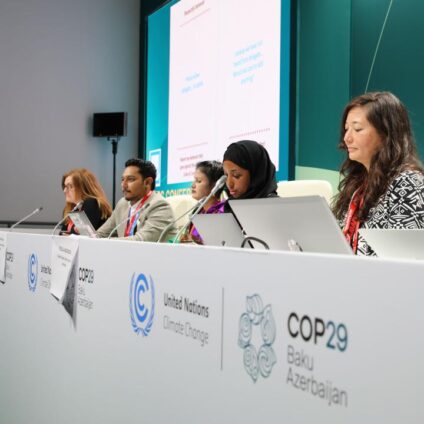"For context, the world spent twice as much on ice cream that year ($71 billion). We can’t avert planetary meltdown by spending less on climate finance than we spend on ice cream.” That is according to Teresa Anderson the Global Climate Justice Lead at ActionAid at the Opening of COP29 in Azerbaijan's capital city Baku on November 11.
Evidence indicates that wealthy countries have been shirking their obligations. For example, in 2022, developed countries collectively contributed only $28-35 billion in grants for climate action in the Global South.
Teresa highlighted that COP29 focuses on setting a new climate finance goal to drive climate action in the Global South, stressing that without financial support, discussions about climate action will remain mere rhetoric.
“They say there is no such thing as a free lunch – well there’s no such thing as a free climate target either. If we’re serious about climate action, we have to pay for climate action,” she stated.
During a press briefing, ActionAid called on the wealthy, polluting countries of the Global North to provide sufficient climate financing for adaptation, mitigation, and loss and damage. The organization stressed that burdening the Global South with the growing costs of climate change is not only unjust but also a recipe for inevitable planetary collapse.
ActionAid emphasized the urgent need for COP29 to establish a new climate finance goal that guarantees trillions of dollars in annual grants. These grants, the organization argued, must come from the wealthy countries of the Global North, which have been responsible for pollution for over a century, and must finally contribute the necessary funds for meaningful climate action.
A community member from the Kalapara region in southern Bangladesh, Mosammat Dulali, shared that during her childhood, she did not witness disasters as intense as those in recent years. She pointed out that between 2007 and 2024, the frequency and severity of such events have drastically increased, with this year alone seeing four cyclones.
“My community is overwhelmed by various problems like houses collapsing, lands submerging, and loss of livelihoods, along with the deaths of livestock, women, and children. Every year, many people, including women and children, die due to drowning, falling trees, or various diseases,” Mosammat said.
Tidal surges from cyclones and floods have increased the salinity of agricultural land reducing the ability of the land to produce enough food for the community.
“In our region, we used to produce a good variety of winter crops, especially lentils and watermelons, and were self-sufficient, but now we can’t."
According to Mosammat, farmers are now growing fewer crops than in the past due to challenges such as drought during the planting season, as well as heavy rains and floods that often destroy their crops.
She noted that the fish population in both rivers and the sea has been declining every year, leading to a shortage of protein for local communities.
“We need the world to act now to address these climate disasters. If it continues like this, we may not have a community left to talk about.”
The Country Program Manager for ActionAid Somaliland, Nura Ahmed Mohamed, stated that in Somaliland, climate change is not just an environmental crisis but a humanitarian disaster with profound gendered consequences. She highlighted that the rising frequency of droughts and flash floods endangers the lives and livelihoods of many families, with women and girls bearing the brunt of these impacts.
“Despite these challenges, women are often the first responders in their communities, taking on roles in caregiving, food production, and managing natural resources. These extreme weather events disrupt agriculture, leading to food shortages, loss of income, and forced displacement.”
In times of crisis, families often turn to harmful coping strategies, such as child marriage, in order to survive. This has led to a significant increase in child marriage rates and cases, while girls are being pulled out of school at distressing levels.
ActionAid is urging wealthy countries to increase their climate finance commitments at this COP, emphasizing that rich, polluting nations have a responsibility to provide financial support for climate action. However, the organization argues that these countries are failing to meet this obligation.
“We want them to commit to grant-based finance and not loans.”
Latest Stories
-
Government is not been fair to WAEC – Clement Apaak on delay to release WASSCE results
1 minute -
Bayer Leverkusen’s Jeremie Frimpong donates to Osu Children’s Home in Ghana
3 hours -
GPL 2024/25: Heart of Lions beat Young Apostles to go three points clear
4 hours -
Dance battles, musical chairs light up Joy FM Party in the Park
4 hours -
Kwabena Kwabena, Camidoh, Kwan Pa Band, others rock Joy FM Family Party in the Park
4 hours -
GPL 2024/2025: Aduana beat struggling Legon Cities
4 hours -
GPL 2024/25: Bechem United fail to honor match against Holy Stars
4 hours -
Cooking competition takes centrestage at Joy FM Family Party In The Park
5 hours -
Album review: ‘Wonder’ by Nana Fredua-Agyeman Jnr
7 hours -
Bouncy castle, sack race, and smiles galore: Joy FM Family Party takes over Aburi Gardens
7 hours -
Watch: Kwan Pa Band thrills patrons at Joy FM Family Party in the Park
7 hours -
Akufo-Addo partly to blame for NPP’s defeat in 2024 election – Frank Agyekum
7 hours -
Rapid urbanisation endangers children’s mental health – Psychiatrist warns
7 hours -
Kedland International School hosts maiden Festival of Nine Lessons and Carols
7 hours -
I didn’t speak against holding wrongdoers accountable – Rev. Kwadwo Bempah clarifies ORAL comment
8 hours

